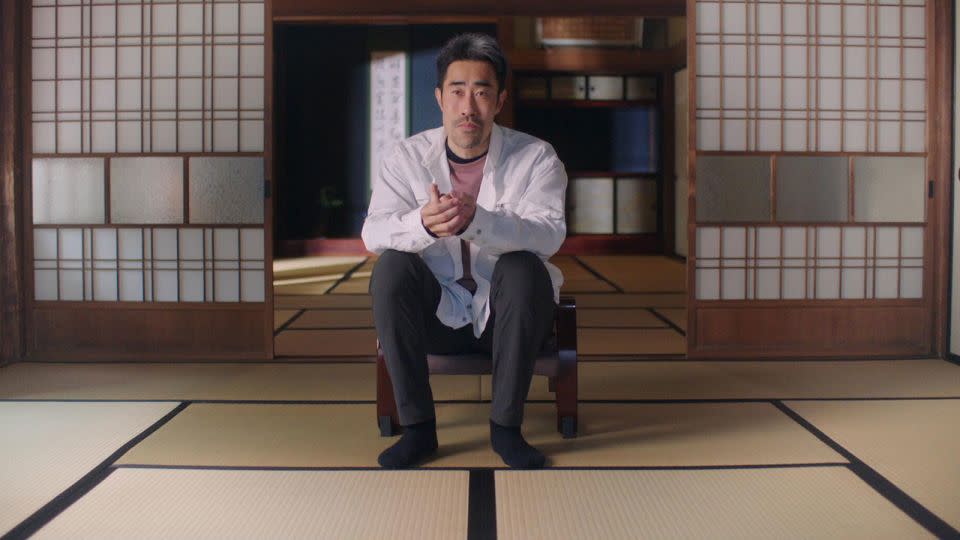‘The Contestant’ tells the stunning tale of when reality TV met ‘The Truman Show’
- Oops!Something went wrong.Please try again later.
Before “The Truman Show” hit theaters or “Big Brother” turned George Orwell’s “1984” concept into a TV show, there was Nasubi, the unlikely (and unwitting) centerpiece of a cruel Japanese game show called “Denpa Shonen.” That strange story, and the road map it provided for the current age of social media and reality TV, gets recounted in “The Contestant,” a stunning documentary premiering on Hulu.
The story at its core practically defies description or belief. In 1998, Tomoaki Hamatsu, an aspiring comedian nicknamed Nasubi, was taken directly from an audition to a small room, where he was told to strip naked and fill out contest coupons trying to win prizes, advised that he must stay there until he earned 1 million yen.
Filmed all the time without any sort of contract, Nasubi remained an object of amusement and fascination for more than a year, featured in a segment of the show subtitled “A Life in Prizes,” almost entirely deprived of contact with the outside world and subsisting on whatever food he could win.
As the footage makes clear, Nasubi – naked, isolated and unaware of how he was perceived beyond that room – at times appeared to be struggling emotionally. Yet the studio audience is shown laughing at his plight, while the producers used an animated eggplant to cover his genitalia on the show.
“I wanted to create something never seen before,” the producer, Toshio Tsuchiya, explains in “The Contestant,” exhibiting no remorse regarding what transpired. In those interviews, he notes that his impulse was always to push the boundaries in terms of “where to draw the line,” matter-of-factly saying that if a contestant were to commit suicide, he would know he had gone too far.
For his part, Nasubi speaks of how “broken” he felt and the producers’ indifference to the psychological and potentially physical toll the experience would exact upon him. “I realized how cruel people could be,” he says, citing the difference between “making people laugh and being laughed at.”

The parallels to “The Truman Show,” the 1998 movie starring Jim Carrey as the unwitting star of a “show” built around his manufactured life, are striking. Nearly a quarter-century after the modern era of reality TV began when “Survivor” and “Big Brother” became instant sensations on CBS, it’s hard not to see flashing warning signs in “The Contestant” that have not only gone ignored but flourished (and really, festered) during the intervening years.
Writer-director Claire TItley, who spent years working on the project, sees various aspects of the story that have become especially relevant, including the way people live their lives publicly on social media. As for the issues relating to reality TV, she told CNN, “I wonder whether we’ve learned any lessons at all. It feels like people are still pushing the boundaries, not necessarily in an ethically and morally good way.”
Titley also pointed to the complicity of the audience, which turned “Denpa Shonen” into a major hit and has continued to flock to titillating reality-TV programming, sometimes with serious consequences for the participants, across the globe.
Indeed, while it’s easy to see Tsuchiya as the documentary’s villain, the events detailed in “The Contestant” couldn’t have happened without there being a fertile market for them.
As Juliet Hindell, a BBC Tokyo correspondent at the time, recalls of covering “A Life in Prizes,” such shows had little difficulty attracting contestants, with the lure that unknown people “could become celebrities practically overnight.” That dynamic persists today.
The price individuals have paid for that, and the callousness baked into it, are among the things “The Contestant” leaves as questions to contemplate. Although Tsuchiya might have succeeded in creating something we hadn’t quite seen before, we’ve been exposed to many different versions of it in the years since, as people have pursued their 15 minutes (or in Nasubi’s case, 15 months) of fame.
“The Contestant” premieres May 2 on Hulu.
For more CNN news and newsletters create an account at CNN.com

